初中七年级英语语法归纳总结知识点
七年级英语知识点归纳总结

七年级英语知识点归纳总结一、基本句型和语法知识:1. be动词的用法a) be动词的形式和人称的搭配:am(I),is(he/she/it),are(you/we/they)b) be动词表示存在:There is/are…c) be动词的否定形式:am not,isn't,aren'td) be动词的一般疑问句和肯定回答:Is/Am/Are…? Yes, it is./No, it isn't.e) be动词的一般疑问句和否定回答:Is/Am/Are…? Yes, they are./No, they aren't.2. 一般现在时的用法a) 一般现在时表示经常性动作和客观事实b) 一般现在时的句子结构:主语+动词原形(第三人称单数要加-s)c) 一般现在时的疑问句及其回答:Do/Does+主语+动词原形? Yes, it does./No, it doesn't.d) 一般现在时的否定句:主语+don't/doesn't+动词原形3. 一般过去时的用法a) 一般过去时表示过去某个时间发生的动作或存在的状态b) 一般过去时的句子结构:主语+动词过去式c) 一般过去时的疑问句及其回答:Did+主语+动词原形? Yes, it did./No, it didn't.d) 一般过去时的否定句:主语+didn't+动词原形4. 现在进行时的用法a) 现在进行时表示现在正在进行的动作b) 现在进行时的句子结构:主语+be动词+动词-ingc) 现在进行时的疑问句及其回答:Am/Is/Are+主语+doing? Yes, they are./No, they aren't.d) 现在进行时的否定句:主语+be动词+not+动词-ing5. 一般将来时的用法a) 一般将来时表示将要发生的动作b) 一般将来时的句子结构:主语+will+动词原形c) 一般将来时的疑问句及其回答:Will+主语+动词原形? Yes, it will./No, it won't.d) 一般将来时的否定句:主语+won't+动词原形6. 一般现在时、一般过去时和现在进行时的区别a) 一般现在时表示现在经常性动作或客观事实,一般过去时表示过去某个时间发生的动作或存在的状态,现在进行时表示现在正在进行的动作b) 句子结构不同:一般现在时主语+动词原形(第三人称单数要加-s),一般过去时主语+动词过去式,现在进行时主语+be动词+动词-ingc) 疑问句结构不同:一般现在时使用do/does,一般过去时使用did,现在进行时使用am/is/ared) 否定句结构不同:一般现在时使用don't/doesn't,一般过去时使用didn't,现在进行时使用be动词+not7. 人称代词的用法a) 主格:I, you, he, she, it, we, theyb) 宾格:me, you, him, her, it, us, themc) 形容词性物主代词:my, your, his, her, its, our, theird) 名词性物主代词:mine, yours, his, hers, its, ours, theirs8. 物主代词和名词所有格的区别a) 物主代词用来代替名词,而名词所有格是名词后面加's或'表示所有关系b) 物主代词的形式:mine, yours, his, hers, its, ours, theirsc) 名词所有格的形式:名词+s,以s结尾的名词加',不可数名词加's9. 句子的分类a) 陈述句:陈述一个事实或声明b) 疑问句:询问一个问题c) 祈使句:表达命令、请求或建议d) 感叹句:表达惊讶、愉快、痛苦等情感10. 形容词和副词的用法a) 形容词用来修饰名词,常放在名词前面b) 副词用来修饰动词、形容词或其他副词,一般放在被修饰词的后面c) 比较级的用法:形容词+er,副词+er,双音节和部分多音节词使用more/most11. 介词的用法a) 介词表示时间、地点、原因等关系b) 常见的介词有:in, on, at, to, from, with, without, of, for, about, by 等12. 数词的用法a) 基数词表示确切的数量,如one, two, three等b) 序数词表示顺序,如first, second, third等c) 分数的表达:分子+分母,如⅓(one-third),¼(a quarter)二、日常生活用语和交际用语:1. 问候和告别的表达a) 早上好:Good morning.b) 下午好:Good afternoon.c) 晚上好:Good evening.d) 晚安:Good night.e) 再见:Goodbye.2. 自我介绍的表达a) What's your name? My name is…b) How old are you? I am…years old.c) Where are you from? I am from…d) What grade are you in? I am in Grade X.3. 问问题和回答问题的表达a) What is this/that? This/That is a…b) What are these/those? These/Those are…c) Is this/that a…? Yes, it is./No, it isn't.d) Are these/those…? Yes, they are./No, they aren't.4. 数字的表达a) 0-10的数字:zero, one, two, three, four, five, six, seven, eight, nine, tenb) 更大数字的表达:eleven, twelve, thirteen, twenty, thirty, forty, fifty, sixty, seventy, eighty, ninety, hundred5. 时间的表达a) 时间的问答:What time is it? It is…b) 学校、作息时间的表达:class, break, lunchtime, bedtime, get up, go to school, go home, do homework, go to bed6. 方位和位置的表达a) 在哪里:Where is…? It is…b) 在附近:near, next to, between, in front of, behind, on, in, under, above, below7. 身体部位的表达a) 头部:head, face, eyes, nose, mouth, earsb) 上肢:arms, shoulders, hands, fingersc) 下肢:legs, knees, feet, toes。
七年级英语语法知识点归纳总结
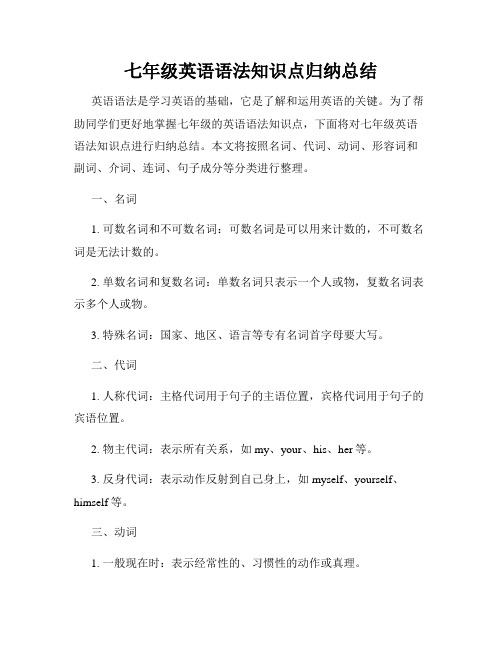
七年级英语语法知识点归纳总结英语语法是学习英语的基础,它是了解和运用英语的关键。
为了帮助同学们更好地掌握七年级的英语语法知识点,下面将对七年级英语语法知识点进行归纳总结。
本文将按照名词、代词、动词、形容词和副词、介词、连词、句子成分等分类进行整理。
一、名词1. 可数名词和不可数名词:可数名词是可以用来计数的,不可数名词是无法计数的。
2. 单数名词和复数名词:单数名词只表示一个人或物,复数名词表示多个人或物。
3. 特殊名词:国家、地区、语言等专有名词首字母要大写。
二、代词1. 人称代词:主格代词用于句子的主语位置,宾格代词用于句子的宾语位置。
2. 物主代词:表示所有关系,如my、your、his、her等。
3. 反身代词:表示动作反射到自己身上,如myself、yourself、himself等。
三、动词1. 一般现在时:表示经常性的、习惯性的动作或真理。
2. 现在进行时:表示正在进行的动作。
3. 一般过去时:表示过去发生的动作。
4. 动词的否定形式和疑问形式:在动词前加"do not"或"does not"构成否定形式,将助动词提到主语前面构成疑问形式。
四、形容词和副词1. 形容词:用来修饰名词,描述人或事物的特征。
2. 副词:用来修饰动词、形容词或其他副词,表示程度、时间、地点等。
五、介词1. 表达地点的介词:in、on、at等。
2. 表达时间的介词:at、on、in等。
3. 表达方式的介词:by、with等。
六、连词1. 并列连词:用于连接并列关系的词语,如and、but等。
2. 从属连词:用于引导从句,如when、if、because等。
七、句子成分1. 主语和谓语:主语是句子的主要组成部分,谓语是主语所表示的动作或状态。
2. 宾语:接受动作的对象,分为直接宾语和间接宾语。
3. 定语:用来修饰名词或代词的成分,可以是形容词、名词性从句等。
4. 状语:修饰动词、形容词和副词的成分,表达时间、地点、方式、原因、条件等。
七年级英语语法知识总结(10篇)
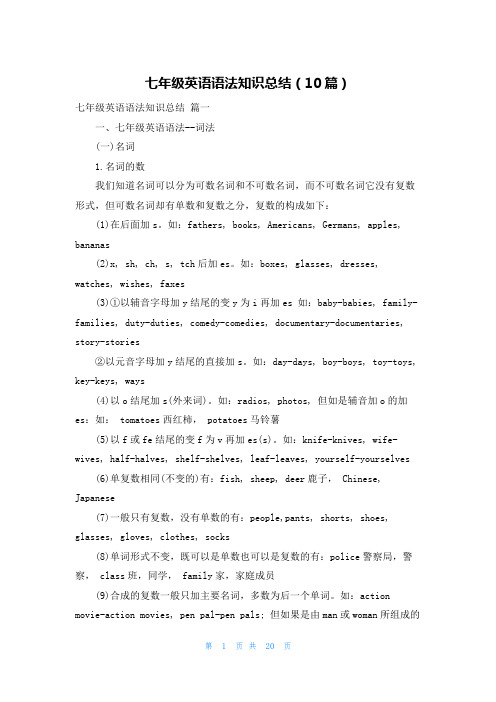
七年级英语语法知识总结(10篇)七年级英语语法知识总结篇一一、七年级英语语法--词法(一)名词1.名词的数我们知道名词可以分为可数名词和不可数名词,而不可数名词它没有复数形式,但可数名词却有单数和复数之分,复数的构成如下:(1)在后面加s。
如:fathers, books, Americans, Germans, apples, bananas(2)x, sh, ch, s, tch后加es。
如:boxes, glasses, dresses, watches, wishes, faxes(3)①以辅音字母加y结尾的变y为i再加es 如:baby-babies, family-families, duty-duties, comedy-comedies, documentary-documentaries, story-stories②以元音字母加y结尾的直接加s。
如:day-days, boy-boys, toy-toys, key-keys, ways(4)以o结尾加s(外来词)。
如:radios, photos, 但如是辅音加o的加es:如: tomatoes西红柿, potatoes马铃薯(5)以f或fe结尾的变f为v再加es(s)。
如:knife-knives, wife-wives, half-halves, shelf-shelves, leaf-leaves, yourself-yourselves (6)单复数相同(不变的)有:fish, sheep, deer鹿子, Chinese, Japanese(7)一般只有复数,没有单数的有:people,pants, shorts, shoes, glasses, gloves, clothes, socks(8)单词形式不变,既可以是单数也可以是复数的有:police警察局,警察, class班,同学, family家,家庭成员(9)合成的复数一般只加主要名词,多数为后一个单词。
七年级上册英语语法总结归纳
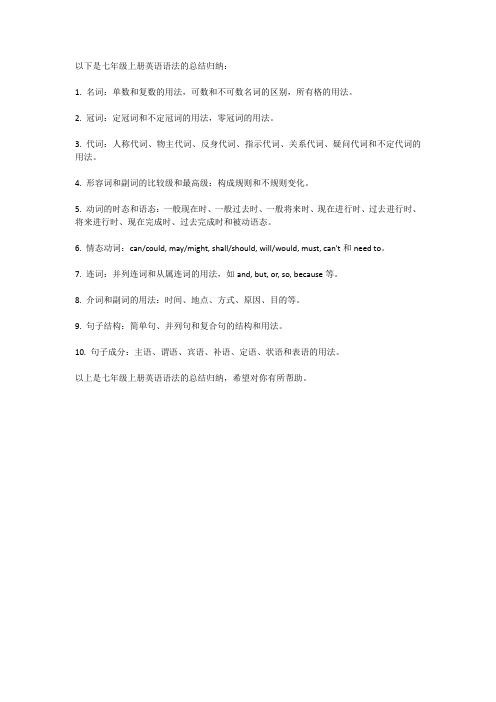
以下是七年级上册英语语法的总结归纳:
1. 名词:单数和复数的用法,可数和不可数名词的区别,所有格的用法。
2. 冠词:定冠词和不定冠词的用法,零冠词的用法。
3. 代词:人称代词、物主代词、反身代词、指示代词、关系代词、疑问代词和不定代词的用法。
4. 形容词和副词的比较级和最高级:构成规则和不规则变化。
5. 动词的时态和语态:一般现在时、一般过去时、一般将来时、现在进行时、过去进行时、将来进行时、现在完成时、过去完成时和被动语态。
6. 情态动词:can/could, may/might, shall/should, will/would, must, can't和need to。
7. 连词:并列连词和从属连词的用法,如and, but, or, so, because等。
8. 介词和副词的用法:时间、地点、方式、原因、目的等。
9. 句子结构:简单句、并列句和复合句的结构和用法。
10. 句子成分:主语、谓语、宾语、补语、定语、状语和表语的用法。
以上是七年级上册英语语法的总结归纳,希望对你有所帮助。
七年级英语语法知识点总结归纳

七年级英语语法知识点总结归纳英语语法作为学习英语的基础,对于学生来说是一个非常重要的部分。
在七年级的学习中,我们需掌握和理解以下英语语法知识点。
一、名词(Noun)名词是指用来表示人、物、动物、地点、事物等的词语。
常见的单数名词加复数形式时,一般在名词后面加-s或-es。
例如:1. 单数名词变复数:table(桌子)变为tables(桌子们)2. 以s, x, ch, sh结尾的名词加-es:bus(公共汽车)变为buses(公共汽车们)二、形容词(Adjective)形容词用来描述名词的特征或者状态。
形容词一般放在名词前面,但也可以放在系动词be的后面。
例如:1. 形容词在名词前面:beautiful(美丽的)girl(女孩)2. 形容词在系动词be后面:The girl is beautiful.(这个女孩很漂亮。
)三、动词(Verb)动词用来表示人或物的动作、行为或者状态。
英语动词根据不同的时态和人称变化。
例如:1. 一般现在时:I play basketball.(我打篮球。
)2. 一般过去时:She danced yesterday.(昨天她跳舞了。
)四、副词(Adverb)副词用来修饰动词、形容词、副词和句子。
通常用来回答when (何时)、how(如何)和where(哪里)等问题。
例如:1. 修饰动词:She runs quickly.(她跑得很快。
)2. 修饰形容词:The dog is very cute.(这只狗非常可爱。
)五、代词(Pronoun)代词是用来代替名词的词语,以避免重复和保持句子的连贯性。
常见的代词有人称代词、物主代词和指示代词等。
例如:1. 人称代词:She is my sister.(她是我的姐姐。
)2. 物主代词:This is his book.(这是他的书。
)六、冠词(Article)冠词是一种特殊的限定词,用于指示名词的特定性或广义性。
英文中常见的冠词有定冠词(the)和不定冠词(a/an)。
七年级语法知识点归纳总结

七年级语法知识点归纳总结一. 名词名词是用来表示人、事物、地点或抽象概念的词语。
名词分为普通名词和专有名词。
普通名词指的是一类人、事物或抽象概念,如:桌子、书籍、爱情等。
而专有名词是特定的人、地点、团体或机构的名称,如:李华、北京、中国等。
名词的数:名词有单数和复数两种形式。
在英语中,大部分名词在末尾加-s或-es来表示复数形式。
例如,book(书)的复数形式是books(书籍)。
名词的所有格:名词的所有格表示所属关系,通常在名词后加-apostrophe(‘)和-s或者在名词后直接加-apostrophe(’)。
例如,girl’s(女孩的),children’s(孩子的)。
名词的分类:名词可以分为可数名词和不可数名词。
可数名词指的是可以用数来计算的名词,而不可数名词指的是不能用数来计算的名词。
例如,book(可数名词)和water(不可数名词)。
名词的用法:1.名词作主语,表语,宾语等。
2.名词前通常加冠词,形容词或代词等修饰词。
3.名词之间可以用连接词如and, but等连接。
4.名词还可以构成复合名词,如:bookstore(书店)、classmate(同学)等。
二. 代词代词是用来代替名词的词语。
代词分为人称代词、物主代词、反身代词、指示代词、相对代词等几种。
1. 人称代词:人称代词用来代替人或事物,包括主格和宾格两种形式。
例如:I(我,主格)、me(我,宾格)。
2. 物主代词:物主代词用来表示所属关系,包括形容词性物主代词和名词性物主代词两种形式。
例如:my(我的,形容词性)和mine(我的,名词性)3. 反身代词:反身代词是表示自己动作的词,包括主格和宾格两种形式。
例如:myself(我自己,主格)和 myself(我自己,宾格)4. 指示代词:指示代词用来指示人、事物或抽象概念,包括this, that, these, those等。
例如:this book(这本书)。
5. 相对代词:相对代词用来代替先行词,并且在从句中充当一个成分。
初一英语知识点总结
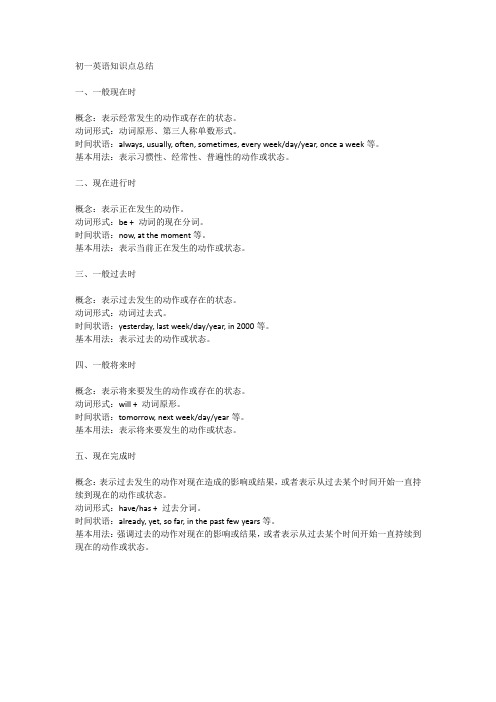
初一英语知识点总结
一、一般现在时
概念:表示经常发生的动作或存在的状态。
动词形式:动词原形、第三人称单数形式。
时间状语:always, usually, often, sometimes, every week/day/year, once a week等。
基本用法:表示习惯性、经常性、普遍性的动作或状态。
二、现在进行时
概念:表示正在发生的动作。
动词形式:be + 动词的现在分词。
时间状语:now, at the moment等。
基本用法:表示当前正在发生的动作或状态。
三、一般过去时
概念:表示过去发生的动作或存在的状态。
动词形式:动词过去式。
时间状语:yesterday, last week/day/year, in 2000等。
基本用法:表示过去的动作或状态。
四、一般将来时
概念:表示将来要发生的动作或存在的状态。
动词形式:will + 动词原形。
时间状语:tomorrow, next week/day/year等。
基本用法:表示将来要发生的动作或状态。
五、现在完成时
概念:表示过去发生的动作对现在造成的影响或结果,或者表示从过去某个时间开始一直持续到现在的动作或状态。
动词形式:have/has + 过去分词。
时间状语:already, yet, so far, in the past few years等。
基本用法:强调过去的动作对现在的影响或结果,或者表示从过去某个时间开始一直持续到现在的动作或状态。
初一英语语法知识点总结归纳
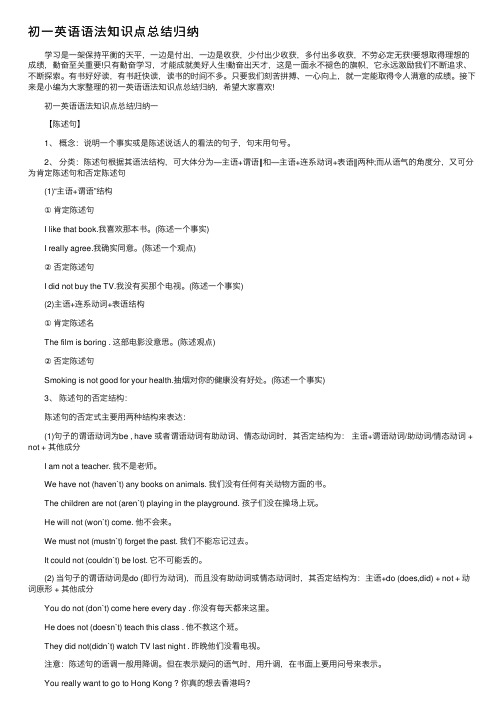
初⼀英语语法知识点总结归纳 学习是⼀架保持平衡的天平,⼀边是付出,⼀边是收获,少付出少收获,多付出多收获,不劳必定⽆获!要想取得理想的成绩,勤奋⾄关重要!只有勤奋学习,才能成就美好⼈⽣!勤奋出天才,这是⼀⾯永不褪⾊的旗帜,它永远激励我们不断追求、不断探索。
有书好好读,有书赶快读,读书的时间不多。
只要我们刻苦拼搏、⼀⼼向上,就⼀定能取得令⼈满意的成绩。
接下来是⼩编为⼤家整理的初⼀英语语法知识点总结归纳,希望⼤家喜欢! 初⼀英语语法知识点总结归纳⼀ 【陈述句】 1、概念:说明⼀个事实或是陈述说话⼈的看法的句⼦,句末⽤句号。
2、分类:陈述句根据其语法结构,可⼤体分为―主语+谓语‖和―主语+连系动词+表语‖两种;⽽从语⽓的⾓度分,⼜可分为肯定陈述句和否定陈述句 (1)“主语+谓语”结构 ①肯定陈述句 I like that book.我喜欢那本书。
(陈述⼀个事实) I really agree.我确实同意。
(陈述⼀个观点) ②否定陈述句 I did not buy the TV.我没有买那个电视。
(陈述⼀个事实) (2)主语+连系动词+表语结构 ①肯定陈述名 The film is boring . 这部电影没意思。
(陈述观点) ②否定陈述句 Smoking is not good for your health.抽烟对你的健康没有好处。
(陈述⼀个事实) 3、陈述句的否定结构: 陈述句的否定式主要⽤两种结构来表达: (1)句⼦的谓语动词为be , have 或者谓语动词有助动词、情态动词时,其否定结构为:主语+谓语动词/助动词/情态动词 + not + 其他成分 I am not a teacher. 我不是⽼师。
We have not (haven`t) any books on animals. 我们没有任何有关动物⽅⾯的书。
The children are not (aren`t) playing in the playground. 孩⼦们没在操场上玩。
七年级下册英语语法知识点归纳总结
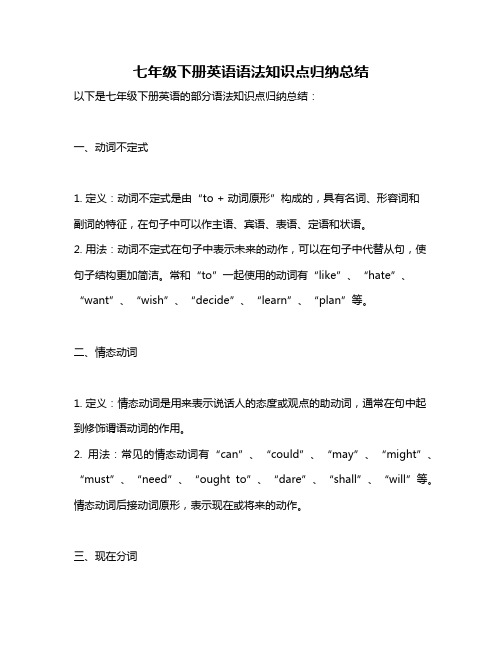
七年级下册英语语法知识点归纳总结以下是七年级下册英语的部分语法知识点归纳总结:一、动词不定式1. 定义:动词不定式是由“to + 动词原形”构成的,具有名词、形容词和副词的特征,在句子中可以作主语、宾语、表语、定语和状语。
2. 用法:动词不定式在句子中表示未来的动作,可以在句子中代替从句,使句子结构更加简洁。
常和“to”一起使用的动词有“like”、“hate”、“want”、“wish”、“decide”、“learn”、“plan”等。
二、情态动词1. 定义:情态动词是用来表示说话人的态度或观点的助动词,通常在句中起到修饰谓语动词的作用。
2. 用法:常见的情态动词有“can”、“could”、“may”、“might”、“must”、“need”、“ought to”、“dare”、“shall”、“will”等。
情态动词后接动词原形,表示现在或将来的动作。
三、现在分词1. 定义:现在分词是动词的一种形式,具有形容词的特征,可以表示正在进行的动作或状态。
2. 用法:现在分词可以作定语、表语和状语。
常和“-ing”一起使用的动词有“seeing”、“feeling”、“thinking”、“doing”、“being”等。
四、介词短语1. 定义:介词短语是由介词和名词或代词构成的短语,用来表示时间、地点、方式等。
2. 用法:介词短语在句子中可以作状语、定语和表语。
常见的介词有“in”、“on”、“at”、“for”、“with”、“by”等。
五、连词1. 定义:连词是用来连接两个句子或从句的词语,表示它们之间的关系。
2. 用法:常见的连词有“and”、“but”、“or”、“so”、“because”、“if”等。
连词在句子中起到承上启下的作用,使句子的意思更加清晰。
以上是七年级下册英语的部分语法知识点归纳总结,希望对你有所帮助。
七年级英语语法知识点归纳总结上册

七年级英语语法知识点归纳总结上册一、名词。
1. 名词的分类。
- 专有名词:表示特定的人、地方、组织等,首字母大写,如China(中国),Tom(汤姆)。
- 普通名词:- 可数名词:有单复数形式,如book(书,单数),books(复数)。
- 不可数名词:没有复数形式,如water(水),milk(牛奶)。
2. 可数名词复数的变化规则。
- 一般情况加 -s,如pen - pens,desk - desks。
- 以s, x, ch, sh结尾的加 -es,如bus - buses,box - boxes,watch - watches,brush - brushes。
- 以辅音字母 + y结尾的,变y为i加 -es,如baby - babies。
- 以f或fe结尾的,变f或fe为v加 -es,如knife - knives,leaf - leaves(但也有一些直接加 -s的,如roof - roofs)。
- 不规则变化,如man - men,woman - women,child - children,foot - feet,tooth - teeth。
3. 名词所有格。
- 有生命的名词所有格:- 一般在名词后加's,如Tom's book(汤姆的书)。
- 以s结尾的复数名词,只加',如the students' classroom(学生们的教室)。
- 表示两者共有时,在后一个名词后加's,如Lucy and Lily's mother(露西和莉莉的妈妈);表示各自拥有时,在每个名词后加's,如Lucy's and Lily's bags (露西的包和莉莉的包)。
- 无生命的名词所有格,用“of+名词”结构,如the window of the room(房间的窗户)。
二、代词。
1. 人称代词。
- 主格:I(我),you(你/你们),he(他),she(她),it(它),we(我们),they(他们/她们/它们),在句中作主语,如I like English.(我喜欢英语)。
七年级上册英语语法归纳总结

七年级上册英语语法归纳总结英语语法是学习英语的重要组成部分,对于七年级的学生来说,掌握基本的语法规则是十分必要的。
在本文中,我将对七年级上册英语的语法知识进行归纳总结,希望对同学们的学习有所帮助。
一、动词的时态1. 一般现在时:表示经常性的动作或者客观事实。
例如:I play basketball every Sunday.(我每个星期天打篮球。
)2. 现在进行时:表示正在进行的动作。
例如:She is reading a book now.(她现在正在读一本书。
)3. 一般过去时:表示过去某个时间发生的动作或者状态。
例如:I visited my grandparents last week.(上个星期我去拜访了我的祖父母。
)4. 过去进行时:表示过去某个时间正在进行的动作。
例如:He was watching TV at 8 o'clock last night.(昨晚八点他在看电视。
)5. 一般将来时:表示将来发生的动作。
例如:We will have a party tomorrow.(我们明天将举办一个聚会。
)二、名词1. 可数名词:表示可以单独计数的名词。
例如:There are three apples on the table.(桌子上有三个苹果。
)2. 不可数名词:表示不能单独计数的名词。
例如:I have some milk.(我有一些牛奶。
)3. 名词所有格:表示所属关系。
例如:This is Mary's book.(这是玛丽的书。
)三、形容词和副词1. 形容词:描述名词的特征。
例如:She is a beautiful girl.(她是一个漂亮的女孩。
)2. 副词:描述动作的方式、程度等。
例如:He speaks English very well.(他英语讲得很好。
)四、介词1. 表示时间:at, in, on等。
例如:I will meet her at 7 o'clock.(我将在七点钟见她。
初一英语语法及主要知识点归纳总结

初一英语知识点归纳总结分类:英语学习Unit 1 Where’s your pen pal from一.短语:1 .be from = come from 来自于----2.live in 居住在---3.on weekends 在周末4 .write to sb = write a letter to sb 给某人写信;写信给某人5 .in the world 在世界上in China 在中国6.pen pal 笔友14 years old 14岁favorite subject 最喜欢的科目7.the United States 美国the United Kingdom 英国New York 纽约8.speak English 讲英语like and dislike 爱憎9.go to the movies 去看电影play sports 做运动二.重点句式:1 Where’s your pen pal from = Where does your pen pal from/2 Where does he live3 What languages does he speak4 I want a pen pal in China.5 I can speak English and a little French.6 Please write and tell me about yourself.7 Can you write to me soon8 I like going to the movies with my friends and playing sports.三.本单元的国家,人民、语言对应;1 Canada---- Canadian---- English / French2 France------ French------French3 Japan------Japanese----Japanese4 Australia----Australian----- English5 the United States------ American---- English6 the United Kingdom---British----- EnghishU nit 2 Where’s the post office一.Asking ways: 问路1.Where is the nearest …… 最近的……在哪里2.Can you tell me the way to …… 你能告诉我去……的路吗3.How can I get to …… 我怎样到达……呢4.Is there …… near here / in the neighborhood 附近有……吗5.Which is the way to ……哪条是去……的路二.Showing the ways: 指路1. Go straight down / along this street. 沿着这条街一直走;2. Turn left at the second turning. 在第二个路口向左转;3. You will find it on your right. 你会在你右手边发现它;4. It is about one hundred metres from here. 离这里大约一百米远;5. You’d bette r take a bus. 你最好坐公交车去;You’d better+动词原形三.词组1. across from …… 在……的对面across from the bank 在银行的对面2. next to…… 紧靠…… next to the supermarket 紧靠超市3. between……and…… 在……和……之间between the park and the zoo 在公园和动物园之间among 表示位于三者或三者以上之间4. in front of…… 在……前面There is a tree in front of the classroom.课室前面有棵树;in the front of…… 在……内的前部There is a desk in the front of the classroom.课室内的前部有张桌子;5. behind…… 在……后面behind my house 在我家后面6. turn left/ right 向左/右拐on the left/right of…… 在某物的左/右边on the left of our school 在我们学校的左边on one’s left/right 在某人的左/右边on my left 在我左边7. go straight 一直走8. down /along…… 沿着……街道down/along Center Street 沿着中央街9. in the neighborhood=near here 在附近10 welcome to…… 欢迎来到……11. take /have a walk 散步12. the beginning o f…… ……的开始,前端at the beginning of…… 在……的开始,前端in the beginning 起初,一开始13. have fun=have a good time=enjoy oneself 玩得开心,过得愉快我昨天玩得很开心; I had fun yesterday.I had a good time yesterday.I enjoyed myself yesterday.14. have a good trip 旅途愉快15. take a taxi 坐出租车16. 到达:get to +地方get here/ there/ home 到这/那/家arrive in +大地方I arrive in Beijing.arrive at +小地方I arrive at the bank.reach +地方17.go across 从物体表面横过go across the street 横过马路go through 从空间穿过go through the forest 穿过树林18.on + 街道的名称; Eg: on Center Streetat + 具体门牌号+街道的名称Eg: at 6 Center Street三.重难点解析1.enjoy doing sth 享受做某事的乐趣,喜爱做某事I enjoy reading. 我喜爱读书;到目前为止,我们学了两个特殊的动词finish和enjoy,都是要带doing.I finish cleaning the room. 我扫完了这间屋子;2.hope to do sth 希望做某事I hope to pass this exam. 我希望通过这次考试; hope +从句I hope tomorrow will be fine. 我希望明天将会晴朗;从句即是一个小句子,这个小句子又放在大句子中,从属于大句子,所以叫从句;如tomorrow will be fine是一个从句,它又放在I hope 的后面,形成句中有句;3. if 引导一个表示假设的句子;If I have much money, I will go to the moon. 如果我有许多钱,我就会去月球;If you are hungry, you can buy some food in the supermarket.如果你饿了的话,你可以在超市买一些食物;四.本单元的反义词、近义词配对1new—old 2 quiet--- busy 3 dirty--- clean 4 big---- smallUnit 3 Why do you like koala bears一.重点词组eat grass eat leaves be quiet very shy very smart very cuteplay with her friends kind of South Africa other animalsat night in the day every day during the day二. 交际用语1. Why do you like pandas Because they’re very clever.2. Why does he like koalas Because they’re kind of interesting.3. Where are lions from They are from South Africa.4. What other animals do you likeI like dogs, too.WhyBecause they’re friendly and clever.5. Molly likes to play with her friends and eat grass.6. She’s very shy.7. He is from Australia.8.He sleeps during the day, but at night he gets up and eats leaves.9.He usually sleeps and relaxes 20 hours every day.10.Let’s see the pandas first.11.They’re kind of interesting.12.What other animals do you like13.Why do you want to see the lions三. 重点难点释义1、kind of 有点,稍微Koala bears are kind of shy. 考拉有点害羞;kind 还有“种类”的意思如:各种各样的all kinds ofWe have all kinds of beautiful flowers in our school.2、China n. 中国Africa n. 非洲China 和Africa都是专有名词,首字母都应该大写,而且和介词in连用;There are many kinds of tigers in China.There are many kinds of scary animals in Africa.3、friendly adj. 友好的,和蔼可亲的它是名词friend的形容词形式,常常和be动词连用, be friendly;The people in Chengdu are very friendly.4、with prep. 跟,同,和…在一起I usually play chess with my father.注意区别与and的用法,and通常用于连接主语或宾语,连接主语时,如果有I, I通常放在and 之后,如:My father and I usually play chess together.Play with “和…一起玩耍”“玩…”I often play with my pet dog.Don’t play with water5、day和night 是一对反义词,day 表示白天或一天,night表示夜或夜晚;通常说in the day, during the day, at night;Koala bears often sleep during the day and eat leaves at night.6、leaf n. 叶子复数形式为:leaves, 类似的变化还有:wife—wives, wolf—wolves, knife—knives等;7、hour n. 小时;点钟hour前边通常加上冠词an 表示“一个小时”, 即:an hour;There are 24 hours in a day and 60minutes in an hour.8、be from 来自…be from = come fromPandas are from China. = Pandas come form China.9、meat n. 食用的肉,为不可数名词,表示“许多”时,使用much来修饰,即:much meatHe eats much meat every day.10、grass n. 草,为不可数名词,表示“许多”时,使用much来修饰,即:much grass; There is much grass on the playground.四. 语法知识特殊疑问句通常以“what”、“who”、“which”、“when”、“where”、“how”、“how old”、“how many”等开头,对某一具体问题进行提问;特殊疑问句的基本构成有两种情况:1. 疑问句+一般疑问句结构;这是最常见的情况;例如:What’s your grandfather’s telephone number 你爷爷的号码是多少Who is that boy with big eyes 那个大眼睛的男孩是谁Which season do you like best 你最喜欢哪个季节When is he going to play the piano 他什么时候弹钢琴Where does he live 他住在哪儿How are you 你好吗How old are you 你多大了How many brothers and sisters do you have 你有几个兄弟姐妹2. 疑问句+陈述句结构;这时疑问词作主语或修饰主语;例如:Who is on duty today今天谁值日Which man is your teacher哪位男士是你的老师我们学过的What/How about+名词/代词+其他也是特殊疑问句,它是一种省略结构;例如:I like English. What/How about you 我喜欢英语;你呢What about playing basketball 打篮球怎么样Unit 4 I want to be an actor.一.短语:1 want to do sth 想要作某事2 give sb sth = give sth to sb 给某人某物/ 把某物给某人3 help sb do sth 帮助某人作某事Eg: I want to help my mother do some housework at home.4 help sb with sth 帮助某人谋事Eg: I want to help my mother with some housework at home5 in the day 在白天6 at night 在晚上7 talk with/ to sb 和----谈话8 be busy doing sth 忙于做某事Eg: He is busy listening to the teacher.9 in a hospital 在医院l10 work/ study hard 努力工作11 Evening Newspaper 晚报二.重点句式及注意事项:1 询问职业的特殊疑问词是what;有三种主要句式①What + is / are + sb②What + does/ do + sb + do③What + is/ are + 名词所有格/ 形容词性物主代词+ job2 People give me their money or get their money from me.3 Sometimes I work in the day and sometimes at night.4 I like talking to people.5 I work late. I’m very busy when people go out to dinners.6 Where does your sister work7 then we have a job for you as a waiter.8 Do you want to work for a magazine Then come and work for us as a reporter.9 Do you like to work evenings and weekends10 We are an international school for children of 5-12.三.本单元中的名词复数;1 policeman--- policemen2 woman doctor----- women doctors 3thief-----thieves首先主谓宾结构I have an apple.其次定状补I really have a big apple.really做have的状语状语修饰动词动词一般就是谓语动词big做apple的定语定语修饰名词名词一般是主语或宾语最后主系表结构它与主谓宾很相似只不过谓语动词时系动词最常见的是be动词及其变形I am a student;主语通常用于句子开端,主要有:i,you,he,she,it,we,they,但it有时用作形式主语,表特指;谓语,通常放在主语之后,一般是动词,表示“某某人在;;;”宾语,通常放在谓语之后,一般是主语的宾格;有时候是人,有时候是物;定语,状语,通常是从句;定语从句:常有关系代词that\which\who\whoes,关系副词when\where\why.通常选择关系词的步骤是:1、确定先行词2.确定关系词.主系表:主,就是主语;系,特指系动词,就是说当句子中没有谓语时,用系动词来代替;表,修饰系动词用;1、名词A、名词的数我们知道名词可以分为可数名词和不可数名词,而不可数名词它没有复数形式,但可数名词却有单数和复数之分,复数的构成如下:一在后面加s;如:fathers, books, Americans, Germans, apples, bananas二x, sh, ch, s, tch后加es;如:boxes, glasses, dresses, watches, wishes, faxes三1以辅音字母加y结尾的变y为i再加es 如:baby-babies, family-families, duty-duties, comedy-comedies, documentary-documentaries, story-stories2以元音字母加y结尾的直接加s;如:day-days, boy-boys, toy-toys, key-keys, ways四以o结尾加s外来词;如:radios, photos, 但如是辅音加o的加es:如: tomatoes 西红柿, potatoes马铃薯五以f或fe结尾的变f为v再加ess;如:knife-knives, wife-wives, half-halves, shelf-shelves, leaf-leaves, yourself-yourselves六单复数相同不变的有:fish, sheep, deer鹿子, Chinese, Japanese七一般只有复数,没有单数的有:people,pants, shorts, shoes, glasses, gloves, clothes, socks八单词形式不变,既可以是单数也可以是复数的有:police警察局,警察, class班,同学, family家,家庭成员九合成的复数一般只加主要名词,多数为后一个单词;如:action movie-action movies, pen pal-pen pals; 但如果是由man或woman所组成的合成词的复数则同时为复数;如:man doctor-men doctors, woman teacher-women teachers十有的单复数意思不同;如:fish鱼fishes鱼的种类, paper纸papers报纸,卷子,论文, work工作works作品,工厂, glass玻璃glasses玻璃杯,眼镜, orange桔子水oranges橙子, light光线lights灯, people人peoples民族, time时间times 时代, 次数, chicken 鸡肉chickens 小鸡十一单个字母的复数可以有两种形式直接加s或’s;如:Is I’s, Ks K’s;但如是缩略词则只加s;如:IDs, VCDs, SARs十二特殊形式的有:child-children, man-men, woman-women, foot-feet, mouse-mice, policeman-policemen, Englishman-EnglishmenB名词的格当我们要表示某人的什么东西或人时,我们就要使用所有格形式;构成如下:一单数在后面加’s;如:brother’s, Mike’s, teacher’s二复数以s结尾的直接在s后加’,如果不是以s结尾的与单数一样处理;如:Teachers’ Day教师节, classmates’; Children’s Day六一节, Women’s Day三八节三由and并列的名词所有时,如果是共同所有同一人或物时,只加最后一个’s,但分别拥有时却分别按单数形式处理;如:Mike and Ben’s room迈克和本的房间共住一间,Mike’s and Ben’s rooms迈克和本的房间各自的房间2、代词项目人称代词物主代词指示代词反身代词人称主格宾格形容词名词性第一人称单数I me my mine myself复数we us our ours ourselves第二人称单数you you your yours yourself复数you you your yours yourselves第三人称单数she her her hers herselfhe him his his himselfit it its its this that itself复数they them their theirs these those themselves3、动词A 第三人称单数当动词是第三人称单数时,动词应该像名词的单数变动词那样加s,如下:一一般在词后加s;如:comes, spells, waits, talks, sees, dances, trains二在x, sh, ch, s, tch后加es;如:watches, washes, wishes, finishes三1以辅音字母加y结尾的变y为i再加es;如:study-studies, hurry-hurries, try-tries2以元音字母加y结尾的直接加s;如:plays, says, stays, enjoys, buys四以o结尾加es;如:does, goes五特殊的有:are-is, have-hasB 现在分词当我们说某人正在做什么事时,动词要使用分词形式,不能用原形,构成如下:一一般在后加ing;如:spell-spelling, sing-singing, see-seeing, train-training, play-playing, hurry-hurrying, watch-watching, go-going, do-doing二以不发音e的结尾的去掉e再加ing;如:dance-dancing, wake-waking,take-taking, practice-practicing, write-writing, have-having三以重读闭音节结尾且一个元音字母+一个辅音字母注意除开字母组合如show –showing, draw-drawing要双写最后的辅音字母再加ing;如:put-putting,run-running, get-getting, let-letting, begin-beginning四以ie结尾的变ie为y再加ing;如:tie-tying系die-dying死lie-lying 位于4、形容词的级我们在对两个或以上的人或物进行对比时,则要使用比较或最高级形式;构成如下:一一般在词后加er或est如果是以e结尾则直接加r或st;如:greater-greatest, shorter –shortest, taller –tallest, longer –longest, nicer- nicest, larger -largest二以重读闭音节结尾且1个元音字母+1个辅音字母字母组合除外,如few-fewer fewest结尾的双写结尾的辅音再加er /est;如:big-bigger biggest, red-redder reddest, hot-hotter hottest三以辅音字母+y结尾的变y为i加er/est;如:happy-happier happiest,sorry-sorrier sorriest, friendly-friendlier friendliestmore friendly most friendly, busy-busier busiest, easy-easier easiest四特殊情况:两好多坏,一少老远good/well - better best many/much - more most bad/ill – worse worstlittle- less least old- older/elder oldest/eldest far- farther/further farthest/furthest 5、数词基变序,有规则;一、二、三,自己背;五、八、九、十二;其它后接th;y结尾,变为i, eth跟上去; first, second, third; fifth, eighth, ninth, twelfth; seventh, tenth, thirteenth, hundredth; twenty-twentieth, forty-fortieth, ninety-ninetieth二、初一英语语法——句式1.陈述句肯定陈述句a This is a book. be动词b He looks very young. 连系动词c I want a sweat like this. 实义动词d I can bring some things to school. 情态动词e There’s a computer on my desk. There be结构否定陈述句a These aren’t their books. b They don’t look nice.c Kate doesn’t go to No. 4 Middle School.d Kate can’t find her doll.e There isn’t a cat here. =There’s no cat here.2. 祈使句肯定祈使句a Please go and ask the man. b Let’s learn Englishc Come in, please.否定祈使句a Don’t be late. b Don’t hu rry.3. 疑问句1 一般疑问句a Is Jim a student b Can I help you c Does she like saladd Do they watch TVe Is she reading肯定回答: a Yes, he is. b Yes, you can. c Yes, she does. d Yes, they do. e Yes, she is.否定回答: a No, he isn’t. b No, you can’t. c No, she doesn’t. d No, they don’t. e No, she isn’t.2 选择疑问句Is the table big or small 回答It’s big./ It’s small.3 特殊疑问句①问年龄How old is Lucy She is twelve.②问种类What kind of movies do you like I like action movies and comedies.③问身体状况How is your uncle He is well/fine.④问方式How do/can you spell it L-double O-K.How do we contact you My e-mail address is cindyjones163.⑤问原因Why do you want to join the club⑥问时间What’s the time =What time is it It’s a quarter to ten a.m..What time do you us ually get up, Rick At five o’clock.When do you want to go Let’s go at 7:00.⑦问地方Where’s my backpack It’s under the table.⑧问颜色What color are they They are light blue.What’s your favourite color It’s black.⑨问人物Who’s that It’s my sister.Who is the boy in blue My brother.Who isn’t at school Peter and Emma.Who are Lisa and Tim talking to⑩问东西What’s this/that in English It’s a pencil case.What else can you see in the picture I can see some broccoli, strawberries and hamburgers.11问姓名What’s your aunt’s name Her name is Helen./She’s Helen. What’s your first name My first name’s Ben.What’s your family name My family name’s Smith.12 问哪一个Which do you like I like one in the box.13 问字母What letter is it It’s big D/small f.14 问价格How much are these pants They’re 15 dollars.15 问号码What’s your phone number It’s 576-8349.16 问谓语动作What’s he doing He’s watching TV.17 问职业身份 What do you do What’s your father He’s a doctor.句子结构1.S主+ Vi不及物动词谓Time flies.1 S + V + adverbial状语Birds sing beautifully.2 S + Vi+ prep Phrase介词短语He went on holiday.3 S + Vi+ Infinitive 不定式We stopped to have a rest.4 S + Vi+ Participle 分词I'll go swimming.2. S 主+ Vt 及物动词谓+ O宾We like English.1 S + VT + N/PronI like music.I like her.2 S + VT + infinitive不定式I want to help him.常用于这句型的动词有:attempt, dare, decide, desire, expect, hope, intend, learn, need, offer, pretend, promise, propose, purpose, refuse, want, wish等;3 S + VT + Wh-Word + InfinitiveI don't know what to do.常用于这句型的动词有:ask, consider, decide, discover, explain, find out, forget, guess, inquire, know, learn, observe, remember, see, settle, tell, think, understand, wonder等;4 S + VT + GerundI enjoy living here.常用于这句型的动词有:admit, advise, avoid, consider, defend, enjoy, excuse, finish, forbid, mind, miss, practise, risk, suggest, give up, can't help等;5 S + VT + That-clauseI don't think that he is right.常用于这句型的动词有:Admit, believe, command, confess, declare, demand, deny, doubt, expect, explain, feel觉得, hear听说, hope, imagine, intend, know, mean, mind当心, notice, propose, request, report, say, see看出,show, suggest, suppose, think, understand, wish, wonder觉得奇怪;3. S 主+ V谓lv 系动词+ P表We are Chinese.除了be 系动词外,还有一些动词也可以用作系动词,1表感官的动词,feel, smell, taste, sound, look, appear, seem 等;2 表转变变化的动词,become, get, grow, turn, go,等; 3表延续的动词remain, keep, seem, hold, stay, rest等;4表瞬时的动词come, fall, set, cut, occur等5其他动词eat, lie, prove, ring, run, shine, sit, stand, continue, hang等;1 S + Lv + N/Pron名词/代词He is a boy.This is mine.2 S + Lv + Adj形容词She is beautiful.3 S + Lv + Adv 副词Class is over.4 S + Lv + Prep PhraseHe is in good health.5 S + Lv + Participle分词He is excited.The film is interesting.4. S 主+ VT 谓+ In O间接宾+ D O直接宾I give you help.1 S + VT + N/Pron + NI sent him a book.I bought May a book.2 S + VT + N/Pron + To/for-phraseHe sent a book to me.He bought a coat for me.间接宾语前需要加to 的常用动词有:allow, bring, deny, do带来, give, grant, hand, leave, lend, offer, owe, pass, pay, permit, promise, read, refuse, render, restore, sell, send, show, teach, tell wish, write等;间接宾语前需要加for 的常用动词有:bring, buy, cash, choose, fetch, get, leave, make, order, paint, play演奏,save, sing, spare等;5. S 主+ VT谓+ O宾+ O C宾补I make you clear.1 S + VT + N/Pron + NWe named our baby Tom.常用于这句型的动词有:appoint, call, choose, elect, entitle, find, make, name, nominate命名;2 S + VT + N/Pron + AdjHe painted the wall white.常用于这句型的动词有:beat, boil, cut, drive, find, get, hold, keep, leave, like, make, paint, see, set, turn, want, wash, wipe, wish等;3 S + VT + N/Pron + Prep PhraseShe always keeps everything in good order.4 S + VT + N/Pron + InfinitiveI wish you to stay.I made him work常用于这句型的动词有:a不定式带to的词:advice, allow, ask, beg, cause, choose, command, decide, encourage, expect, force, get, hate, invite, know, leave, like, love, order, permit, persuade, prefer, remain, request, teach, tell, want, warn, wish等;b不定式不带to的词:feel, have, hear, know, let, listen to, look at, make, notice, see, watch等;5 S + VT + N/Pron + Participle 分词I heard my name called.I feel something moving.常用于这句型的动词有:catch, feel, find, get, have, hear, imagine, keep, leave, listen to, look at, notice, observe, perceive, see, set, smell, start, watch等;6 S + VT + N/Pron + Wh-word + InfinitiveHe show me how to do it.常用于这句型的动词有:advise, ask, inform, show, teach, tell等;7 S + VT + N/Pron + That-clauseHe told me that the film was great.常用于这句型的动词有:assure, inform, promise, remind, teach, tell, warm等;8 S + VT + N/Pron + Wh-ClauseHe asked me what he should do.常用于这句型的动词有:Advise, ask, inform, show, teach, tell.三、初一英语语法——时态1、一般现在时表示普遍、经常性的或长期性的动作时使用一般现在时,它有:Be 动词:She’s a worker. Is she a worker She isn’t a worker.情态动词:I can play the piano. Can you play the piano I ca n’t play the piano.行为动词:They want to eat some tomatoes. Do they want to eat any tomatoes They don’t want to eat any tomatoes.Gina has a nice watch. Does Gina have a nice watch Gina doesn’t have a watch.2、现在进行时表示动词在此时正在发生或进行就使用进行时态,结构为sb be v-ing sth + 其它.I’m playing baseball. Are you playing baseball I’m not playing baseball. Nancy is writing a letter. Is Nancy writing a letter Nancy isn’t writing a letter.They’re listening to the pop music. Are they listening the pop music They aren’t list ening to the pop music.一.短语:1 .be from = come from 来自于----2.live in 居住在---3.on weekends 在周末4 .write to sb = write a letter to sb 给某人写信;写信给某人5 .in the world 在世界上in China 在中国6.pen pal 笔友14 years old 14岁favorite subject 最喜欢的科目7.the United States 美国the United Kingdom 英国New York 纽约8.speak English 讲英语like and dislike 爱憎9.go to the movies 去看电影play sports 做运动二.重点句式:1 Where’s your pen pal from = Where does your pen pal from/2 Where does he live3 What languages does he speak4 I want a pen pal in China.5 I can speak English and a little French.6 Please write and tell me about yourself.7 Can you write to me soon8 I like going to the movies with my friends and playing sports.三.本单元的国家,人民、语言对应;1 Canada---- Canadian---- English / French2 France------ French------French3 Japan------Japanese----Japanese4 Australia----Australian----- English5 the United States------ American---- English6 the United Kingdom---British----- EnghishUnit 2 Where’s the post office一.Asking ways: 问路1.Where is the nearest …… 最近的……在哪里2.Can you tell me the way to …… 你能告诉我去……的路吗3.How can I get to …… 我怎样到达……呢4.Is there …… near here / in the neighborhood 附近有……吗5.Which is the way to …… 哪条是去……的路二.Showing the ways: 指路1. Go straight down / along this street. 沿着这条街一直走;2. Turn left at the second turning. 在第二个路口向左转;3. You will find it on your right. 你会在你右手边发现它;4. It is about one hundred metres from here. 离这里大约一百米远;5. You’d better take a bus. 你最好坐公交车去;You’d better+动词原形三.词组1. across from …… 在……的对面across from the bank 在银行的对面2. next to…… 紧靠…… next to the supermarket 紧靠超市3. between……and…… 在……和……之间between the park and the zoo 在公园和动物园之间among 表示位于三者或三者以上之间4. in front of…… 在……前面There is a tree in front of the classroom.课室前面有棵树;in the front of…… 在……内的前部There is a desk in the front of the classroom.课室内的前部有张桌子;5. behind…… 在……后面behind my house 在我家后面6. turn left/ right 向左/右拐on the left/right of…… 在某物的左/右边on the left of our school 在我们学校的左边on one’s left/right 在某人的左/右边on my left 在我左边7. go straight 一直走8. down /along…… 沿着……街道down/along Center Street 沿着中央街9. in the neighborhood=near here 在附近10 welcome to…… 欢迎来到……11. take /have a walk 散步12. the beginning of…… ……的开始,前端at the beginning of…… 在……的开始,前端in the beginning 起初,一开始13. have fun=have a good time=enjoy oneself 玩得开心,过得愉快我昨天玩得很开心; I had fun yesterday.I had a good time yesterday.I enjoyed myself yesterday.14. have a good trip 旅途愉快15. take a taxi 坐出租车16. 到达:get to +地方get here/ there/ home 到这/那/家arrive in +大地方I arrive in Beijing.arrive at +小地方I arrive at the bank.reach +地方17.go across 从物体表面横过go across the street 横过马路go through 从空间穿过go through the forest 穿过树林18.on + 街道的名称; Eg: on Center Streetat + 具体门牌号+街道的名称Eg: at 6 Center Street三.重难点解析1.enjoy doing sth 享受做某事的乐趣,喜爱做某事I enjoy reading. 我喜爱读书;到目前为止,我们学了两个特殊的动词finish和enjoy,都是要带doing.I finish cleaning the room. 我扫完了这间屋子;2.hope to do sth 希望做某事I hope to pass this exam. 我希望通过这次考试; hope +从句I hope tomorrow will be fine. 我希望明天将会晴朗;从句即是一个小句子,这个小句子又放在大句子中,从属于大句子,所以叫从句;如tomorrow will be fine是一个从句,它又放在I hope 的后面,形成句中有句;3. if 引导一个表示假设的句子;If I have much money, I will go to the moon. 如果我有许多钱,我就会去月球; If you are hungry, you can buy some food in the supermarket.如果你饿了的话,你可以在超市买一些食物;四.本单元的反义词、近义词配对1new—old 2 quiet--- busy 3 dirty--- clean 4 big---- smallUnit 3 Why do you like koala bears一.重点词组eat grass eat leaves be quiet very shy very smart very cuteplay with her friends kind of South Africa other animalsat night in the day every day during the day二. 交际用语1. Why do you like pan das Because they’re very clever.2. Why does he like koalas Because they’re kind of interesting.3. Where are lions from They are from South Africa.4. What other animals do you likeI like dogs, too.WhyBecause they’re friendly and clever.5. Molly likes to play with her friends and eat grass.6. She’s very shy.7. He is from Australia.8.He sleeps during the day, but at night he gets up and eats leaves. 9.He usually sleeps and relaxes 20 hours every day.10.Let’s see the pandas first.11.They’re kin d of interesting.12.What other animals do you like13.Why do you want to see the lions三. 重点难点释义1、kind of 有点,稍微Koala bears are kind of shy. 考拉有点害羞;kind 还有“种类”的意思如:各种各样的all kinds ofWe have all kinds of beautiful flowers in our school.2、China n. 中国Africa n. 非洲China 和Africa都是专有名词,首字母都应该大写,而且和介词in连用;There are many kinds of tigers in China.There are many kinds of scary animals in Africa.3、friendly adj. 友好的,和蔼可亲的它是名词friend的形容词形式,常常和be动词连用, be friendly;The people in Chengdu are very friendly.4、with prep. 跟,同,和…在一起I usually play chess with my father.注意区别与and的用法,and通常用于连接主语或宾语,连接主语时,如果有I, I通常放在and 之后,如:My father and I usually play chess together.Play with “和…一起玩耍”“玩…”I often play with my pet dog.Don’t play with water5、day和night 是一对反义词,day 表示白天或一天,night表示夜或夜晚;通常说in the day, during the day, at night;Koala bears often sleep during the day and eat leaves at night.6、leaf n. 叶子复数形式为:leaves, 类似的变化还有:wife—wives, wolf—wolves, knife—knives等;7、hour n. 小时;点钟hour前边通常加上冠词an 表示“一个小时”, 即:an hour;There are 24 hours in a day and 60minutes in an hour.8、be from 来自…be from = come fromPandas are from China. = Pandas come form China.9、meat n. 食用的肉,为不可数名词,表示“许多”时,使用much来修饰,即:much meatHe eats much meat every day.10、grass n. 草,为不可数名词,表示“许多”时,使用much来修饰,即:much grass; There is much grass on the playground.四. 语法知识特殊疑问句通常以“what”、“who”、“which”、“when”、“where”、“how”、“how old”、“how many”等开头,对某一具体问题进行提问;特殊疑问句的基本构成有两种情况:1. 疑问句+一般疑问句结构;这是最常见的情况;例如:What’s your grandfather’s telephone number 你爷爷的号码是多少Who is that boy with big eyes 那个大眼睛的男孩是谁Which season do you like best 你最喜欢哪个季节When is he going to play the piano 他什么时候弹钢琴Where does he live 他住在哪儿How are you 你好吗How old are you 你多大了How many brothers and sisters do you have 你有几个兄弟姐妹2. 疑问句+陈述句结构;这时疑问词作主语或修饰主语;例如:Who is on duty today今天谁值日Which man is your teacher哪位男士是你的老师我们学过的What/How about+名词/代词+其他也是特殊疑问句,它是一种省略结构;例如:I like English. What/How about you 我喜欢英语;你呢What about playing basketball 打篮球怎么样Unit 4 I want to be an actor.一.短语:1 want to do sth 想要作某事2 give sb sth = give sth to sb 给某人某物/ 把某物给某人3 help sb do sth 帮助某人作某事Eg: I want to help my mother do some housework at home.4 help sb with sth 帮助某人谋事Eg: I want to help my mother with some housework at home5 in the day 在白天6 at night 在晚上7 talk with/ to sb 和----谈话8 be busy doing sth 忙于做某事Eg: He is busy listening to the teacher.9 in a hospital 在医院l10 work/ study hard 努力工作11 Evening Newspaper 晚报二.重点句式及注意事项:1 询问职业的特殊疑问词是what;有三种主要句式①What + is / are + sb②What + does/ do + sb + do③What + is/ are + 名词所有格/ 形容词性物主代词+ job2 People give me their money or get their money from me.3 Sometimes I work in the day and sometimes at night.4 I like talking to people.5 I work late. I’m very busy when people go out to dinners.6 Where does your sister work7 then we have a job for you as a waiter.8 Do you want to work for a magazine Then come and work for us as a reporter.9 Do you like to work evenings and weekends10 We are an international school for children of 5-12.三.本单元中的名词复数;。
七年级英语语法归纳总结

七年级英语语法归纳总结七年级英语语法归纳总结如下:1. 动词的时态:- 现在时:表示经常性的动作、习惯、真理和现在的状态等。
- 过去时:表示过去发生的动作或状态。
- 将来时:表示将来要发生的动作或状态。
2. 一般现在时:- 肯定句:主语+动词原形+其他。
- 否定句:主语+do not/does not+动词原形+其他。
- 疑问句:Do/Does+主语+动词原形+其他?3. 一般过去时:- 肯定句:主语+动词过去式+其他。
- 否定句:主语+did not+动词原形+其他。
- 疑问句:Did+主语+动词原形+其他?4. 一般将来时:- 肯定句:主语+will+动词原形+其他。
- 否定句:主语+will not+动词原形+其他。
- 疑问句:Will+主语+动词原形+其他?5. 名词的单复数:- 一般情况下,名词在单数形式后面加-s来表示复数。
- 以s、sh、ch、x结尾的名词,在单数形式后面加-es来表示复数。
- 以辅音字母+y结尾的名词,在单数形式后面去y,变成i,再加-es来表示复数。
- 以o结尾的名词,有些加-s,有些加-es来表示复数。
6. 形容词的比较级和最高级:- 一般情况下,形容词的比较级在词尾加-er,最高级在词尾加-est。
- 以e结尾的形容词,在词尾直接加-r,-st来表示比较级和最高级。
- 以辅音字母+y结尾的形容词,在词尾去y,变成i,再加-er,-est来表示比较级和最高级。
- 部分形容词的比较级和最高级有不规则变化。
7. 代词的用法:- 主格代词:作主语或作表语。
- 宾格代词:作动词或介词的宾语。
- 形容词性物主代词:用来表示所有关系。
- 名词性物主代词:作主语、宾语或表语。
- 反身代词:表示自己。
8. 冠词的用法:- 定冠词:表示特指的人或物,用the。
- 不定冠词:表示泛指的人或物,用a/an。
- 零冠词:不用任何冠词。
9. 介词的用法:- 表示时间:in/on/at。
初中七年级英语语法归纳总结知识点

初中七年级英语语法归纳总结知识点1) leave的用法1.“leave+地点”表示“离开某地”。
例如:When did you leave Shanghai?你什么时候离开上海的?2.“leavefor+地点”表示“动身去某地”。
例如:Next Friday, XXX.下周五,XXX要去伦敦了。
3.“leave+地点+for+地点”表示“离开某地去某地”。
例如:Why are you leaving Shanghai for Beijing?你为什么要离开上海去北京?2)情态动词should“应该”学会使用should作为情态动词用,常常表示意外、惊奇、不能理解等,有“竟会”的意思,例如:How should I know?我怎么知道?Why should you be so late today?你本日为何来得这么晚?should有时表示应当做或发生的事,例如:We should help each other.我们应当互相帮助。
我们在使用时要注意以下几点:1.用于表示“应该”或“不应该”的概念。
此时常指长辈教导或责备晚辈。
例如:You should be here with clean hands.你应该把手洗干净了再来。
2.用于提出意见劝导别人。
例如:You should go to the doctor if you XXX.如果你感觉不舒服,你最好去看医生。
3.用于表示可能性。
should的这一用法是考试中常常出现的考点之一。
例如:XXX.我们在晚饭前就能到了。
She should be here any moment.她随时都大概来。
3) What...?与Which...?1. what与which都是疑问代词,都可以指人或事物,但是what仅用来询问职业。
如:What is your father?你父亲是干什么的?该句相当于:XXX do?What is your father's job?Which指代的是特定范围内的某一个人。
初中七年级英语语法归纳总结语法规则知识点

初中七年级英语语法归纳总结语法规则知识点主语和谓语的一致性* 主谓一致:主语单数,谓语动词用单数形式;主语复数,谓语动词用复数形式。
The cat is sleeping.is sleeping.The cats are playing.are playing.* 谓语动词的单三形式:当主语是第三人称单数时,谓语动词用单数第三人称形式。
He likes to play basketball.likes to play basketball.人称代词* 主格人称代词:作主语时使用。
I, you, he, she, it, we, you, they* 宾格人称代词:作宾语时使用。
me, you, him, her, it, us, you, them一般现在时* 一般现在时:表示经常性行为。
I play soccer every Saturday.play soccer every Saturday.一般过去时* 一般过去时:表示过去发生的事情。
I visited my grandparents last weekend.visited my grandparents last weekend.* 一般过去时的动词变化规则:1. 一般情况下,动词加-ed。
2. 以不发音的-e结尾的动词,直接加-d。
3. 以辅音字母+y结尾的动词,变y为i,再加-ed。
4. 以一个辅音字母结尾的重读闭音节单词,双写最后一个辅音字母,再加-ed。
like -> likedpat -> pattedstudy -> studiedstop -> stopped一般将来时* 一般将来时:表示将来要发生的事情。
I will visit my grandparents next weekend.will visit my grandparents next weekend.* 一般将来时的助动词构成:will + 动词。
七年级英语必背知识点归纳
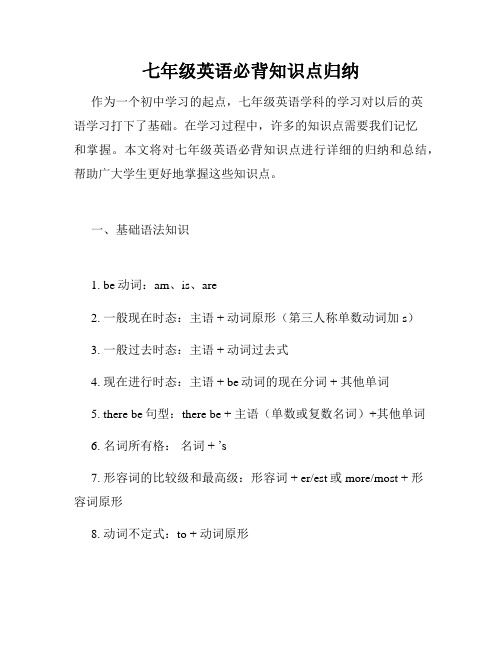
七年级英语必背知识点归纳作为一个初中学习的起点,七年级英语学科的学习对以后的英语学习打下了基础。
在学习过程中,许多的知识点需要我们记忆和掌握。
本文将对七年级英语必背知识点进行详细的归纳和总结,帮助广大学生更好地掌握这些知识点。
一、基础语法知识1. be动词:am、is、are2. 一般现在时态:主语 + 动词原形(第三人称单数动词加s)3. 一般过去时态:主语 + 动词过去式4. 现在进行时态:主语 + be动词的现在分词 + 其他单词5. there be句型:there be + 主语(单数或复数名词)+其他单词6. 名词所有格:名词+ ’s7. 形容词的比较级和最高级:形容词 + er/est或more/most + 形容词原形8. 动词不定式:to + 动词原形9. 情态动词:can、could、should、must、may、might、will、would等二、基础词汇1. 数字:0-1000的数字拼写2. 时间:一天、一周、一个月、一年以及基础时间词汇3. 家庭与亲戚:父母、兄弟姐妹、祖父母、叔伯姑姨、表亲等4. 食品:蔬菜、水果、肉类、饮品等基础食品词汇5. 学科:数学、科学、语文、历史、地理等基础学科词汇6. 颜色:基础颜色词汇,如red、green、blue等7. 动物:基础动物词汇,如dog、cat、fish、bird等三、基础表达技巧1. 提问技巧:如何使用wh-词提问2. 口语表达技巧:如何用英语表达时间、日期等基础问题3. 疑问句的转化:如何将陈述句转化为疑问句及反之4. 辨认单词意思:如何通过上下文推测单词意思5. 听力技巧:如何听懂并理解简单的英语听力材料四、基础听力和阅读理解1. 简单的英语日常对话听力材料,如问候语、自我介绍、约会等2. 简单的英语日常对话阅读理解,如问路、购物、点餐等3. 英语短文阅读理解,包括人物故事、科普知识、文化继承等4. 简单的英语广告、海报、标志等相关阅读素材五、考试技能要点1. 考试中答题要点,如认真审题、明确答题目标、注重语法和拼写等2. 考试中用时管理技能,如计算整个考试用时、掌握各题型预期用时等3. 考试中心态控制技能,如紧张情绪调控、自信心态建设等总结以上是七年级英语必背知识点的归纳,这些知识点是学习英语的基础,必须学好,记牢。
初一英语必备语法知识点归纳
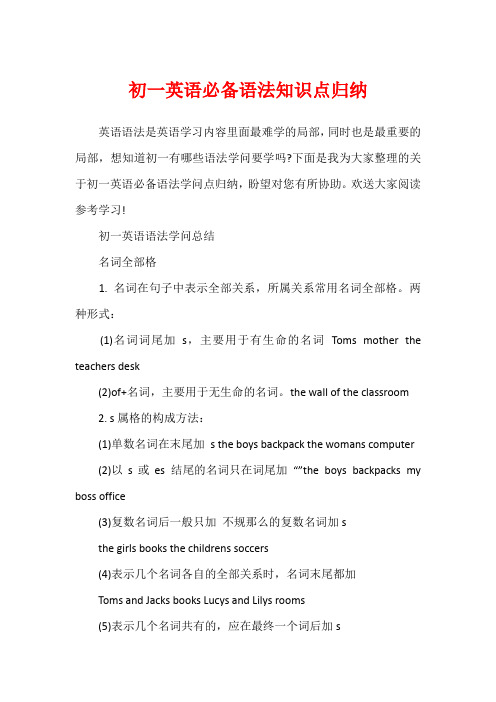
初一英语必备语法知识点归纳英语语法是英语学习内容里面最难学的局部,同时也是最重要的局部,想知道初一有哪些语法学问要学吗?下面是我为大家整理的关于初一英语必备语法学问点归纳,盼望对您有所协助。
欢送大家阅读参考学习!初一英语语法学问总结名词全部格1. 名词在句子中表示全部关系,所属关系常用名词全部格。
两种形式:(1)名词词尾加s,主要用于有生命的名词Toms mother the teachers desk(2)of+名词,主要用于无生命的名词。
the wall of the classroom2. s属格的构成方法:(1)单数名词在末尾加s the boys backpack the womans computer(2)以s或es 结尾的名词只在词尾加“”the boys backpacks my boss office(3)复数名词后一般只加不规那么的复数名词加sthe girls books the childrens soccers(4)表示几个名词各自的全部关系时,名词末尾都加Toms and Jacks books Lucys and Lilys rooms(5)表示几个名词共有的,应在最终一个词后加sTom and Jacks mother Lucy and Lilys room(6)表示时间、距离、重量、国家、城市等无生命的名词后也可以加s表示其全部关系an hours walk the citys parks(7)在表示店铺或教堂的名字或某人的家时,名词全部格的后面时时不出现它所修饰的名词。
my uncles (house) the doctors(office)初一英语语法学问要点句子成分:英语句子成分分为七种:主语、谓语、宾语、定语、状语、表语、宾语补足语。
1、主语是句子所要说的人或事物,答复是“谁”或者“什么”。
通常用名词或代词担当。
如:Im Miss Green.2、谓语动词说明主语的动作或状态,答复“做(什么)”。
七年级语法知识点归纳总结

七年级语法知识点归纳总结一、名词的基本用法名词是指人、事物、地方或抽象概念的名称。
在句子中,名词可以作为主语、宾语、表语、定语等。
常见的名词有可数名词和不可数名词。
1.可数名词–可数名词可以单数形式和复数形式存在。
–单数名词前可以用不定冠词“a”或“an”来修饰,而复数名词前则不用。
–可数名词的复数形式通常在词尾加“s”或“es”。
–有些可数名词的复数形式发生不规则变化,如man变为men,child变为children等。
2.不可数名词–不可数名词只有单数形式,不能用复数形式表示数量。
–不可数名词通常表示抽象概念,如love、happiness等。
–不可数名词前不能用不定冠词“a”或“an”来修饰,通常也不能用数词修饰,而要使用量词或具体的量来表示数量。
二、动词的时态和语态动词是表示行为或状态的词语。
动词的时态和语态可以根据不同的情况进行变换。
1.动词的时态–现在时:表示现在正在进行的动作或状态,常用动词原形。
–过去时:表示过去发生的动作或状态,常在动词原形后加上“ed”。
–将来时:表示将来要发生的动作或状态,常用助动词“will”加上动词原形。
2.动词的语态–主动语态:表示主语是动作的执行者。
–被动语态:表示主语是动作的承受者,常用助动词“be”加上动词的过去分词形式构成。
三、形容词和副词的用法形容词和副词是用来修饰名词、动词或其他形容词或副词的词语。
1.形容词–形容词用来修饰名词,描述名词的性质或特征。
–形容词通常位于名词之前,用来表示名词的大小、颜色、形状、性质等。
–形容词有比较级和最高级两种形式,用来表示比较和最高水平。
2.副词–副词用来修饰动词,表示动作的方式、程度、时间等。
–副词可以修饰形容词或其他副词,表示程度或方式。
–副词有比较级和最高级两种形式,用来表示比较和最高水平。
四、代词的基本用法代词是用来代替名词的词语,可以避免重复使用名词。
1.人称代词–人称代词用来代替人的名词,包括主格、宾格和所有格。
七年级英语语法知识点归纳总结
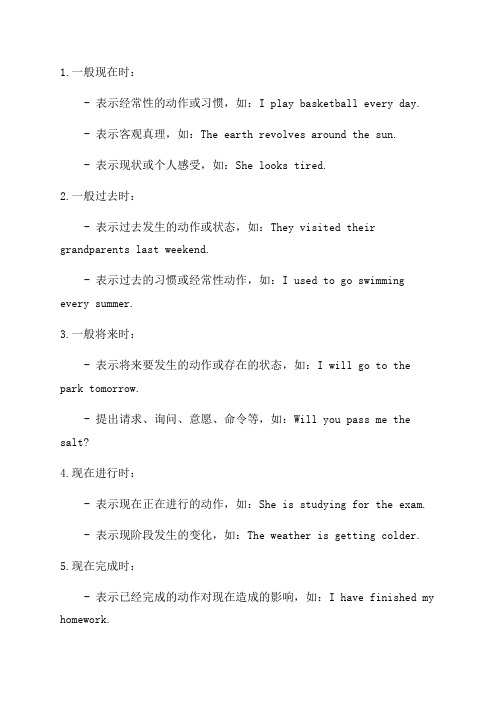
1.一般现在时:- 表示经常性的动作或习惯,如:I play basketball every day.- 表示客观真理,如:The earth revolves around the sun.- 表示现状或个人感受,如:She looks tired.2.一般过去时:- 表示过去发生的动作或状态,如:They visited their grandparents last weekend.- 表示过去的习惯或经常性动作,如:I used to go swimming every summer.3.一般将来时:- 表示将来要发生的动作或存在的状态,如:I will go to the park tomorrow.- 提出请求、询问、意愿、命令等,如:Will you pass me the salt?4.现在进行时:- 表示现在正在进行的动作,如:She is studying for the exam.- 表示现阶段发生的变化,如:The weather is getting colder. 5.现在完成时:- 表示已经完成的动作对现在造成的影响,如:I have finished my homework.- 表示发生在过去,但与现在有关的动作或经验,如:She has been to Paris.6.一般过去时与现在完成时的区别:7.现在完成进行时:- 表示过去开始,一直持续到现在的动作,如:He has beenplaying football for two hours.- 表示过去一段时间内的连续动作,如:I have been studying English since last year.8.情态动词:- 表示说话人的推测、猜测,如:He might be at home.- 表示能力、许可、必要性等概念,如:You can swim in the pool.- 表示建议、命令、请求等,如:You should eat more vegetables.9.及物动词与不及物动词:- 及物动词后面需要跟宾语,如:I eat an apple.- 不及物动词后面不需要跟宾语,如:He runs fast.10.名词:- 表示人、物、地方、抽象概念等,如:I have a book.- 可以用来做主语、宾语等,如:Playing tennis is fun.11.形容词与副词:- 形容词用来修饰名词,如:She is a beautiful girl.- 副词用来修饰动词、形容词、副词等,如:He runs fast.12.比较级与最高级:- 表示两者之间的比较,用比较级,如:She is taller than me.- 表示超过两个以上的比较,用最高级,如:He is the tallest boy in the class.13.代词:- 人称代词表示说话人、对话人或被谈论的人,如:I, you, he, she, it, we, they.- 物主代词表示所有关系,如:mine, yours, his, hers, its, ours, theirs.- 反身代词表示动作的反身性,如:myself, yourself, himself, herself, itself, ourselves, themselves.14.特殊疑问句:- 对疑问词进行提问,如:What is your name? Where do you live?15.间接引语:- 把别人的话转述成自己的话,如:He said that he was tired.这些是七年级英语语法的一些基本知识点,掌握好这些知识点可以帮助同学们更好地理解和运用英语。
七年级英语语法知识点归纳

七年级英语语法知识点归纳英语是一门语法较为严谨的语言,掌握好语法规则对于学好英语至关重要。
下面将对七年级英语语法知识点进行归纳总结,为同学们的学习提供帮助。
一、名词1.名词的单复数英语名词的单复数是一个基础语法知识点,它在英语语言中起到了非常重要的作用。
名词单数通常通过在词尾加“-s”转变成复数形式,但这并非是全部情况。
有些词变换时,要通过词尾的变化、词干的变化以及词形的变化完成,例如:child—children,man—men等。
2.名词所有格名词所有格是指表达的是属于某一物体或人的事物,一般要在名词后面加上“’s”表示所属关系。
但如果名词已经以“s”结尾,则只需在名词后面加上“’”表示所有格;或直接在名词后加上“’”。
二、代词1.人称代词人称代词根据不同的人称有不同的形式。
第一人称单数代词有“I”,第二人称单数代词有“you”,第三人称单数代词则分别为“he”、“she”、“it”;而第一人称复数、第二人称复数、第三人称复数的代词分别为“we”、“you”、“they”等。
2.物主代词物主代词通常用于表示某一物体或人的所有权,要根据名词的单复数、性别以及所属情况来确定。
如:我的(my)、你的(your)、他的(his)、她的(her)、他们的(their)等。
三、动词1.动词的时态动词的时态分为一般现在时、一般过去时和一般将来时。
其中,一般现在时表示目前正在进行或持续的事情,一般过去时表示过去发生的事情,一般将来时表示将要发生的事情。
2.动词的语态英语中有主动语态和被动语态两种语态。
主动语态表示动作的主体是谁,而被动语态则表示动作的承受者是谁。
被动语态的构成需要用到助动词“be”和过去分词,如:The book was written by the famous author.四、形容词和副词1.形容词和副词的比较级和最高级形容词和副词都有比较级和最高级的形式。
比较级常用于比较两个物体或人,它的构成方式是在词尾加上“-er”,如:taller、slower等。
- 1、下载文档前请自行甄别文档内容的完整性,平台不提供额外的编辑、内容补充、找答案等附加服务。
- 2、"仅部分预览"的文档,不可在线预览部分如存在完整性等问题,可反馈申请退款(可完整预览的文档不适用该条件!)。
- 3、如文档侵犯您的权益,请联系客服反馈,我们会尽快为您处理(人工客服工作时间:9:00-18:30)。
4)频度副词的位置
1.常见的频度副词有以下这些:
always(总是,一直)
usually(通常)
often(常常,经常)
sometimes(有时候)
never(从不)
2.频度副词的位置:
a.放在连系动词、助动词或情态动词后面。如:
David is often arrives late for school.
Did you study English before you came here?你来这儿之前学过英语吗?
d.与否定副词not合用,构成否定句,例如:
I don't like him.我不喜欢他。
e.加强语气,例如:
Do come to the party tomorrow evening.明天晚上一定来参加晚会。
该句相当于:
What does your father do?
What is your father's job?
Which指代的是特定范围内的某一个人。如:
---Which is Peter?哪个是皮特?
---The boy behind Mary.玛丽背后的那个男孩。
2. What...?是泛指,所指的事物没有范围的限制;而Which...?是特指,所指的事物有范围的限制。如:
有时我步行回家,有时我骑自行车。
3.never放在句首时,主语、谓语动词要倒装。如:
Never have I been there.
5) every day与everyday
1. every day作状语,译为“每一天”。如:
We go to school at 7:10 every day.
我们每天7:10去上学。
Remember to go to the post office after school.
记着放学后去趟邮局。
Don't you remember seeing the man before?
你不记得以前见过那个人吗?
8) It's for sb.和It's of sb.
1.for sb.常用于表示事物的特征特点,表示客观形式的形容词,如easy, hard, difficult, interesting, impossible等:
你的日常活动是什么?
6)什么是助动词
1.协助主要动词构成谓语动词词组的词叫助动词(Auxiliary Verb)。被协助的动词称作主要动词(Main Verb)。
助动词自身没有词义,不可单独使用,例如:
He doesn't like English.他不喜欢英语。
(doesn't是助动词,无词义;like是主要动词,有词义)
大卫上学经常迟到。
b.放在行为动词前。如:
We usually go to school at 7:10 every day.
我们每天经常在7:10去上学。
c.有些频度副词可放在句首或句尾,用来表示强调。如:
Sometimes I walk home, sometime I rides a bike.
3.for与of的辨别方法:
用介词后面的代词作主语,用介词前边的形容词作表语,造个句子。如果道理上通顺用of,不通则用for。如:
You are nice. (通顺,所以应用of)。
He is hard. (人是困难的,不通,因此应用for。)
9)对两个句子的提问
新目标英语在命题中有将对句子划线提问这一题型取消的趋势,现在采取的作法是对一个句子进行自由提问。例如:
like doing sth喜欢做某事
keep sb doing sth使某人一直做某事
find sb doing sth发现某人做某事
see/hear/watch sb doing sth看到/听到/观看某人做某事
很显然,学生多了更多的回答角度,也体现了考试的灵活性。再如:
句子:He usually goes to the park with his friends at 8:00 on Sunday.
提问:1.Who usually goes to the park with his friends at 8:00 on Sunday?
He did know that.他的确知道那件事。
3.最常用的助动词有:be, have, do, shall, will, should, would
7) forget doing/to do与remember doing/to do
1.forget to do忘记要去做某事。(未做)
forget doing忘记做过某事。(已做)
What color do you like best?(所有颜色)
你最喜爱什么颜色?
Which color do you like best, blue, green or yellow?(有特定的范围)
你最喜爱哪一种颜色?
3. what与which后都可以接单、复数名词和不可数名词。如:
Which pictures are from China?
How should I know?我怎么知道?
Why should you be so late today?你今天为什么来得这么晚?
should有时表示应当做或发生的事,例如:
We should help each other.我们应当互相帮助。
我们在使用时要注意以下几点:
1.用于表示“应该”或“不应该”的概念。此时常指长辈教导或责备晚辈。例如:
You should be here with clean hands.你应该把手洗干净了再来。
2.用于提出意见劝导别人。例如:
You should go to the doctor if you feel ill.如果你感觉不舒服,你最好去看医生。
3.用于表示可能性。should的这一用法是考试中常常出现的考点之一。例如:
别忘了明天来。(to come动作未做)
典型例题
---- The light in the office is still on.
---- Oh,I forgot___.
A. turning it off B. turn it off
C. to turn it off D. having turned it off
He is so funny a boy.
Jim has so big a house.
2.such与不定冠词a、an连用,结构为“such+a/an+形容词+名词”。如:
It is such a nice day.
That was such an interesting story.
11)使用-ing分词的几种情况
下周五,爱丽斯要去伦敦了。
3.“leave+地点+for+地点”表示“离开某地去某地”。例如:
Why are you leaving Shanghai for Beijing?
你为什么要离开上海去北京?
2)情态动词should“应该”学会使用
should作为情态动词用,常常表示意外、惊奇、不能理解等,有“竟会”的意思,例如:
初中七年级英语语法归纳总结知识点
1) leave的用法
1.“leave+地点”表示“离开某地”。例如:
When did you leave Shanghai?
你什么时候离开上海的?
2.“leave for+地点”表示“动身去某地”。例如:
Next Friday, Alice is leaving for London.
We have fun learning English this term.
They had problems getting to the top of the mountain.
4.在介词后面。如:
Thanks for helping me.
Are you good at playing basketball.
5.What time does he usually go to the park with his friends on Sunday?
6.When does he usually go to the park with his friends?
10) so、such与不定冠词的使用
1.so与不定冠词a、an连用,结构为“so+形容词+a/an+名词”。如:
I decide to read English every day.
我决定每天读英语。
2. everyday作定语,译为“日常的”。
She watches everyday English on TV after dinner.
她晚饭后在电视上看日常英语。
What's your everyday activity?
句子:The boy in blue has three pens.
提问:1.Who has three pens?
2.Which boy has three pens?
3.What does the boy in blue have?
4.How many pens does the boy in blue have?
2.Where does he usually go with his friends at 8:00 on Sunday?
3.What does he usually do with his friends at 8:00 on Sunday?
4.With whom does he usually go to the park at 8:00 on Sunday?
